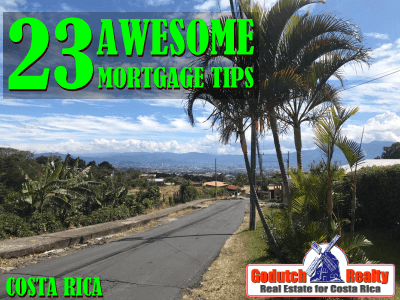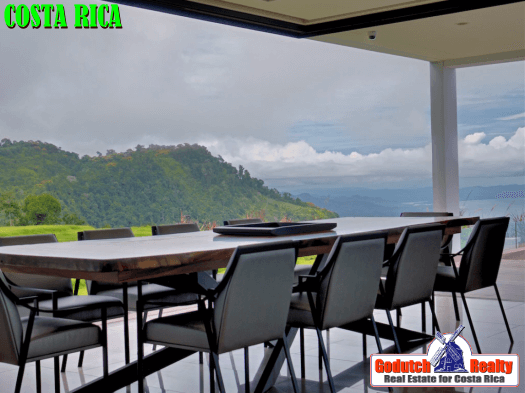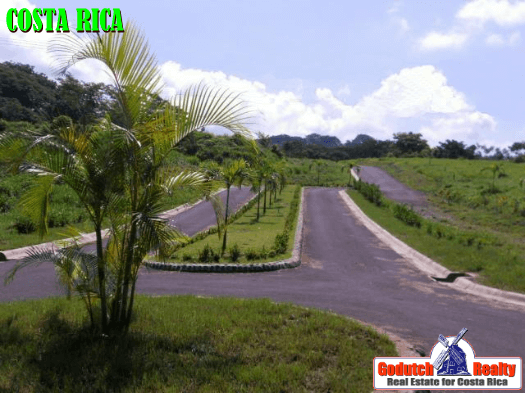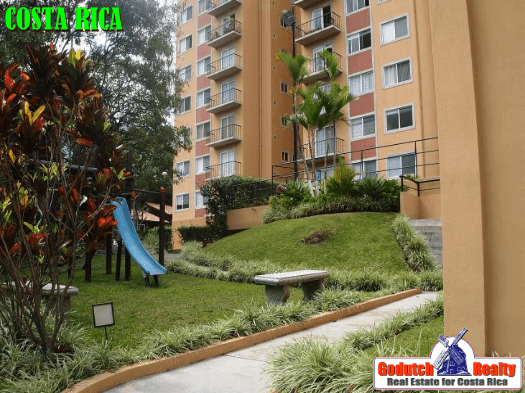Estimated Reading Time: 6 Minutes

If you are looking to make a property purchase you’ll love the mortgage tips. In fact, using these mortgage tips will save you time, money, and effort.
When you go to view houses on sale, the seller’s agent may make the buying process seem easy and straightforward. If the price is right, there is nothing that should stop you from purchasing the home. However, do you have the money to buy it?
Purchasing a home is a project that requires you to do your research well. You have to know where you stand financially, get the right home, and find a way to pay for it. Many people apply for a mortgage when they want to buy a home not knowing they’ll get into financial trouble down the road. Bad debt will tie you for years.
Therefore, do not rush to apply for a mortgage without researching and consulting widely. Pay close attention to these mortgage tips.

These 23 mortgage tips will help you in your quest for a property in Costa Rica.
1. Shop first
Shop around for a mortgage and find out what everyone in the mortgage industry can offer. Check the interest rates, terms, fees, and other conditions attached to the loan offers.
2. Pre-Qualify
Get pre-qualified so you know how much loan you qualify for.
3. Determine income
To get pre-qualified for a loan, the lender will need to determine your debt-to-income (DTI) ratio. Therefore, you will have to provide the lender with proof of income and your recurring fixed monthly costs.
4. Go to a bank
There are no exclusive mortgage firms in Costa Rica. To apply for a mortgage, you’ll need to apply to banks.
5. Are you a resident or a citizen?
Most banks in Costa Rica only offer mortgages to residents and citizens. If you are a non-resident investor, look for private lenders or developer financing options. These lenders will usually require you to purchase private mortgage insurance.
6. Terms and Conditions
Before settling a lender, read and compare the terms and conditions of the mortgage packages that multiple lenders are willing to offer you.
7. Loan To Value
Most banks lend 70 to 80 percent of the home value (LTV). On the other hand, private lenders offer up to 50 percent of the value of the home. Any bank will want you to our at least 30% of your own money down to lower their risk factor.
8. Proof of Income
Lenders accept various proofs of income. For example, if you are employed, your employer can give proof of income. If you have your own business, you can supply a CPA.
9. The Loan Term
Check the terms of the home loan. Depending on the lender, your age, and other factors, you may be given a term of 10 years, 15 years, or 20 years.
10. Admin Fees
Find out how much you will pay in terms of administration fees for your loan application, usually 1.5 percent of the loan.

11. Interest Rate
Find out the interest rate that you’ll be charged for the loan. Beware that lenders usually offer a fixed rate for the first 2 years only. Then the interest rate will adjust every year.
12. How long to apply?
Banks take longer to approve home loans compared to private lenders. With a bank, it can be up to three months before your application is approved. On the other hand, private lenders can offer you a loan within 30 days of your application.
13. Look for property
With this information, you can start looking for properties whose price ranges are within your pre-approval limit.
14. Negotiate Purchase Price
Once you have found the property you want, you and your real estate agent can negotiate the purchase price.
15. Home Inspection
Before you finalize the offer and put any money down, hire a home inspector.
16. Sign Offer
Have a signed offer by you and the seller (your real estate agent should do this) before asking your lawyer to write up a purchase-sale agreement or letter of intent before applying for a loan. This purchase–sale agreement will state all the purchase and financial details.
17. Medical Exam
Most lenders may require you to take a medical exam, depending on your age. Therefore, factor the cost 0f the examination into the fees to be paid.
18. Life Insurance
Your lender may require you to purchase life insurance. If you have an existing life policy, the lender may require proof of annual policy payment.
19. Fire Insurance
You’ll have to take fire and earthquake insurance to cover the cost of the construction.
20. Closing Fees
Expect to pay around 3 percent of the sales price as the closing fees. These fees cover property transfer fees and attorney fees.

21. Real Estate Commission
Any real estate commission is usually covered by the seller. Therefore, there is no reason not to use an agent to help you find a home in Costa Rica.
22. Reconfirm Loan Terms
Before closing, confirm with your loan officer that the terms of the loan are the same as before.
23. Other fees
Include recurring payments such as HOA fees in your monthly budget.
In conclusion, I’m sure these mortgage tips will assist you in taking the right decisions when buying a property in Costa Rica. Looking for an expert real estate company to assist you in your property purchase? Then contact us now.
Looking for a mortgage?
Are you looking for a residential mortgage and you don’t have legal residency in Costa Rica? Then fill out the form below and we’ll connect you with a private lender:
[gravityform id=”3″ title=”false” description=”false” ajax=”true”]
If you like this blog, subscribe to my newsletter by clicking the banner below.
I DO want to remind our readers that we appreciate any referrals you can send us. Also, please remember the GoDutch Realty agents when you talk about your home in Costa Rica, we appreciate it.

























